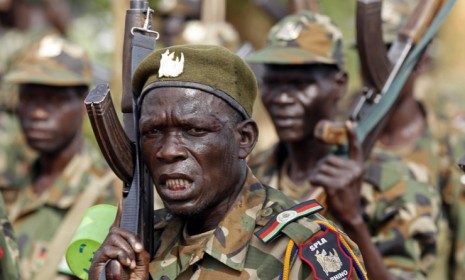3 ways to defuse the deadly Sudan conflict
Tensions continue to flare along the disputed oil-rich border dividing Sudan and South Sudan. What will it take to avoid an immensely painful civil war?

A free daily email with the biggest news stories of the day – and the best features from TheWeek.com
You are now subscribed
Your newsletter sign-up was successful
Sudan and South Sudan continued inching closer to all-out war on Thursday, as the longtime rivals traded accusations designed to paint each other as the aggressor. South Sudan said its northern neighbor had bombed a village in the oil-rich Unity state along the two nations' contested border. In response, Khartoum accused South Sudan of beating captured soldiers. Can anything stop the sister nations from renewing a civil war that killed two million people over two decades? Here, three crucial steps to restore peace:
1. The U.S. must stand by South Sudan
It would be a mistake to treat both sides equally, as Sudan is the true aggressor, says Jendayi Frazer at the Council on Foreign Relations. South Sudan has no means to defend itself from the north's constant bombing. "We need to give [South Sudan] a security blanket," and tell the north, "If you mess with the South, you mess with the United States." That's the only way to stop the fighting long enough to get both sides back to the negotiating table to settle disputes over border lines and sharing oil revenue that should have been resolved before South Sudan seceded last year.
The Week
Escape your echo chamber. Get the facts behind the news, plus analysis from multiple perspectives.

Sign up for The Week's Free Newsletters
From our morning news briefing to a weekly Good News Newsletter, get the best of The Week delivered directly to your inbox.
From our morning news briefing to a weekly Good News Newsletter, get the best of The Week delivered directly to your inbox.
2. China has to step up, too
China, the biggest oil customer at Port Sudan, is in a unique position to play peacemaker, says Daniel Howden at Britain's The Independent. During the 20-year Sudanese civil war, China acted like a "comic book villain," protecting its commercial interests by blocking any attempt by the United Nations Security Council to punish the Sudanese regime for "war crimes against its own population." The Sudanese divorce "has divided that oil between two countries," so now China has a stake in restoring peace. If Beijing commits itself, it can surely help get both sides to work out their differences.
3. The world should pay Sudan for peace
The South's secession was a bitter pill for Sudanese President Omar al-Bashir to swallow, says Mark Tran at Britain's Guardian. South Sudan got two-thirds of Sudanese oil reserves, and "the loss of oil revenues has left Khartoum with a financial black hole of about $7 billion." That's why diplomats are floating a "grand plan" to make up for the shortfall through a mix of belt-tightening in Khartoum, cash from China and Gulf states, and higher fees for transferring oil from landlocked South Sudan to Sudan's port. Really, the world ought to just pay off Sudan: "$7 billion to buy peace looks like a bargain."
A free daily email with the biggest news stories of the day – and the best features from TheWeek.com
-
 How the FCC’s ‘equal time’ rule works
How the FCC’s ‘equal time’ rule worksIn the Spotlight The law is at the heart of the Colbert-CBS conflict
-
 What is the endgame in the DHS shutdown?
What is the endgame in the DHS shutdown?Today’s Big Question Democrats want to rein in ICE’s immigration crackdown
-
 ‘Poor time management isn’t just an inconvenience’
‘Poor time management isn’t just an inconvenience’Instant Opinion Opinion, comment and editorials of the day